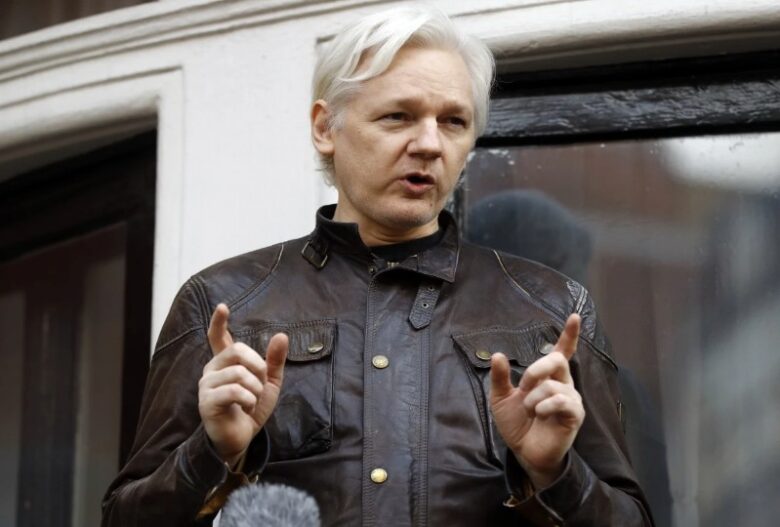Julian Assange, the founder of WikiLeaks, returned to his native Australia on Wednesday aboard a charter jet, hours after pleading guilty to charges of obtaining and publishing U.S. military secrets in a deal with Justice Department prosecutors. This marks the conclusion of a long legal saga surrounding his actions.
Assange departed from a British prison on Monday and is slated to appear later this week in a U.S. federal court located in the Northern Mariana Islands, a U.S. commonwealth in the Western Pacific.
According to the Justice Department, he is anticipated to plead guilty to an Espionage Act charge related to conspiring to unlawfully obtain and disseminate classified national defense information, as stated in a court-filed letter.
The anticipated guilty plea, pending judicial approval, marks a sudden end to a criminal case of international intrigue and the U.S. government’s protracted pursuit of a publisher.
Julian Assange’s immensely popular secret-sharing website made him a cause célèbre among press freedom advocates who viewed him as a journalist exposing U.S. military misconduct.
However, investigators have consistently argued that his actions violated laws designed to safeguard sensitive information and jeopardized national security.
Following his plea and sentencing scheduled for Wednesday morning local time in Saipan, the largest island in the Northern Mariana Islands, Julian Assange is expected to return to his native Australia.
The hearing is being held in Saipan, the largest island in the Northern Mariana Islands, due to Assange’s reluctance to travel to the continental U.S. and the court’s proximity to Australia, according to prosecutors.
As of Monday, attorneys representing Assange had not responded to requests for comment.
WikiLeaks released a statement confirming that Julian Assange boarded a plane and left the United Kingdom on Monday, having been released from the British prison where he spent the last five years.
The statement expressed appreciation for the support received, acknowledging those who stood by and fought for Assange’s freedom.
“WikiLeaks highlighted groundbreaking stories of government corruption and human rights abuses, holding the powerful accountable for their actions,” WikiLeaks stated.
“As editor-in-chief, Julian Assange endured significant hardship for these principles and the public’s right to information.”
Under the deal, Assange will admit guilt without facing further imprisonment. Previously, he sought refuge in the Ecuadorian embassy in London for years to avoid arrest by Swedish authorities on rape allegations, before ultimately being detained in the United Kingdom.
Assange is anticipated to receive a sentence equivalent to the five years he has already served in the high-security British prison while resisting extradition to the U.S. to face charges.
This process has unfolded through a series of hearings in London. Recently, he secured the right to appeal an extradition order after his legal team argued that assurances from the U.S. government regarding his free speech protections were “blatantly inadequate,” particularly compared to those afforded to American citizens.
Assange has been widely celebrated globally as a hero who exposed military misconduct in Iraq and Afghanistan.
One of the documents released by WikiLeaks included a video that depicted a 2007 Apache helicopter attack carried out by American forces in Baghdad, resulting in the deaths of 11 people, including two Reuters journalists.
However, his reputation has also been marred by rape allegations, which he has consistently denied.
In its 2019 indictment, the Justice Department accused Assange of allegedly encouraging and aiding U.S. Army intelligence analyst Chelsea Manning in stealing diplomatic cables and military files, which WikiLeaks published in 2010.
Prosecutors contended that Assange’s actions posed a threat to national security by disseminating documents that compromised the interests of the United States and its allies, while also aiding its adversaries.
According to a charging document filed in connection with the plea agreement, prosecutors asserted that Assange conspired with Chelsea Manning to receive and acquire documents, notes, and other writings related to national defense, and to “willfully communicate” those records.
The document explicitly states that Assange, as a non-U.S. citizen without a U.S. security clearance or authorization, was not permitted to possess, access, or control documents, writings, or notes concerning the national defense of the United States, including classified information.
The case drew strong criticism from press advocates and supporters of Julian Assange. Federal prosecutors defended their actions, arguing that the charges went beyond typical journalistic activities by alleging Assange’s involvement in soliciting, stealing, and indiscriminately publishing classified government documents.
The decision to pursue the case was made despite the Obama administration’s earlier decision not to prosecute him.
The plea agreement follows President Joe Biden’s earlier consideration of Australia’s request to drop the U.S. prosecution of Assange.
However, according to a White House official who spoke anonymously to The Associated Press, the White House was not involved in the decision to resolve Assange’s case.
Chelsea Manning was sentenced to 35 years in prison for violating the Espionage Act and other offenses by leaking classified government and military documents to WikiLeaks.
In 2017, President Barack Obama commuted her sentence, leading to her release after approximately seven years in custody.
Julian Assange gained significant attention in 2016 when WikiLeaks published Democratic emails that prosecutors allege were stolen by Russian intelligence operatives.
Although he was not charged in special counsel Robert Mueller’s Russia investigation, the inquiry highlighted the extensive role of the hacking operation in interfering in the 2016 election to benefit then-Republican candidate Donald Trump.
Initially, Justice Department officials deliberated over charges against Assange following the 2010 publication of the documents, questioning the potential viability of such a case in court and grappling with the challenge of equating his actions to those of a conventional journalist.
The approach shifted significantly under the Trump administration. In 2017, former Attorney General Jeff Sessions made Assange’s arrest a priority, marking a distinct change in policy from previous administrations.
In 2012, Assange sought refuge in the Ecuadorian Embassy and was granted political asylum following English court rulings that supported his extradition to Sweden for a rape investigation.
His asylum status was withdrawn by Ecuador’s government in 2019, leading to his arrest by British police.
He was subsequently jailed for violating bail conditions that arose when he initially sought shelter inside the embassy.
Assange’s family and supporters have expressed concerns about his deteriorating physical and mental health over more than a decade of legal struggles, including seven years spent inside the Ecuadorian Embassy in London.
Throughout his prolonged legal battles, Assange’s family and supporters have expressed growing concerns about his declining physical and mental health, particularly during the seven years he spent inside the Ecuadorian Embassy in London.
Even though Sweden eventually dropped its sex crimes investigation due to the passage of time, Assange has continued to be detained in London’s high-security Belmarsh Prison amidst his extradition battle with the U.S.









Got a Question?
Find us on Socials or Contact us and we’ll get back to you as soon as possible.